Please download and post a flyer here.
June 1 – August 31, 2020
Factor e Farm, Kansas City, USA
90 days of immersion hands-on builds where you collaborate and build things you would never have dreamed of building yourself.
Happening as 3 month-long sessions. Each month is self-contained:
- June 1 – June 30, 2020 – Open Source Microfactory – Building 3D printers, 3D printer for full metal printing, CNC torch table, CNC router, CNC mill, plastic shredders and filament makers as the core of a multipurpose microfactory.
- July 1 – July 31, 2020 – Heavy Machines – Using the machines of the first month to prototype our next generation tractor, bulldozer, trancher, backhoe, auger, Compressed Earth Block (CEB) press, and soil mixer.
- August 1 – August 31, 2010 – Construction and Aquaponics – Combining all the machines and skills of the first 2 months to build low cost microhouses with integrated aqupaonics systems.
Build Yourself. Build Your World.
Did you ever want to design or build something – but did not know where to start? To address the need for practical skills and agency in today’s largely digital world – we created a summer program where you will learn more hands-on skills – across more diverse areas – than you would in a lifetime. You will learn to build 3D printers, CNC machines, tractors, houses, aquaponic systems – and much more. By leveraging open source design, group collaboration and swarm builds – and by building on open source part libraries – you will learn and absorb an experience that will shatter any limitations you may have regarding what is possible to build. You just may get more diverse, hands-on, design-build skills over this summer than you will in your lifetime, as you shift towards full agency in creating the world around you…

Our unique program provides an in-depth immersion spanning a wide range of fields. You’ll have a chnce to learn how to build a 3D printer and other production machines, tractors, microhouses, and aquaponic greenhouses – and solar tractors and printers that print in full metal – to name a few of the projects. You will learn the basic principles of design, and you’ll be able to turn your ideas into prototypes, so you can turn your prototypes into a business. We will teach you the basic language of design spanning many fields – so you can apply these skills to shape the world that you would like to build. We will teach you about our Construction Set approach – with common libraries of parts – to make powerful design achievable with basic skills – and turned to reality with open source tools.
You will learn and be proficient in CAD, 3D printing, electronics, microcontrollers, coding. You’ll build by hand a 3D printer, a cordless welder, a pen plotter, and even a Raspberry Pi tablet.

You’ll even get to take the things you build home with you after the program ends! That includes the 3D Printer and the Raspberry Pi tablet! So you will always have an effective open hardware development kit ready when you are.
In the first 4 days, you will learn how to design just about anything in FreeCAD, as you design and print various tools you’ll be using throughout the program- you’ll even have built your own 3D Printer by the end of your first day. You’ll also build a Raspberry Pi a Video Studio with lights, camera, tripod, and slider – so you can document and do time lapses. But it gets really interesting once we get to the larger machines, construction, and aquaponics.
The key to making what seems impossible to do in such a short time period possible – is group collaboration and teamwork. We’re passionate about the power that focused and structured collaboration unleashes, and know you will be too after this experience. We discovered how we can get large groups of people to participate in effective, swarm builds – so we can build an entire tractor – or even a house – in just one day. You will be amazed how this works once participate in this yourself.

We focus on collaboration and 100% open source toolchains – allowing you to build viable products collectively in a small fraction of the time it would take to do on your own with YouTube videos as your only support.
It’s like a crash course for open hardware,You WILL learn, you WILL build relationships and friendships, you WILL have fun, and you WILL be blown away by what you’re capable doing – both collaboratively and alone.
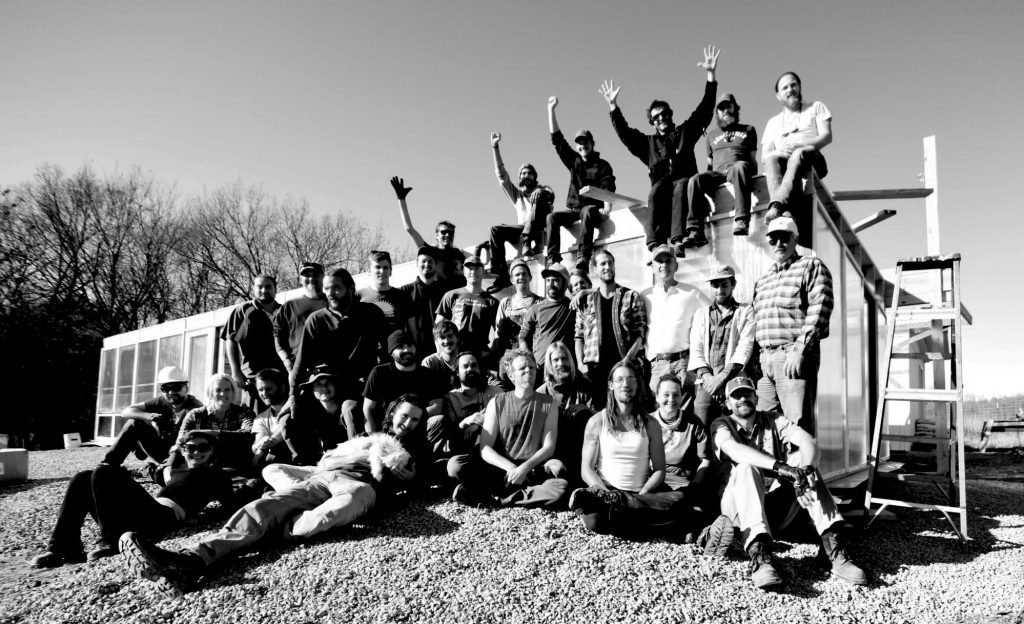
We welcome young women and men of any age to dive right in – to push the limits of rapid learning – to explore the limits of what we all can do together- with open hardware technology – through open collaboration.
We focus on collaborative design – and this is our largest and most ambitious summer camp and build session to date. Building upon a decade of experience, hundreds of builds, and several product releases – we invite you to roll up your sleeves and contribute to the development of real technology that matters. For us – we’re interested in creating a rapid learning, practical experience – as practical skills are sorely missing in today’s digital world. So we decided to do something about it by offering a kind of experience that we only wished we got in college.
Join us for a fun experience that will shake your world, expand your mind, and reframe your definition of what’s possible. Upgrade your software (in your head), get out your open source tool kit for collaboration, and change the world!Enrollment is limited so please register now.

In essence, the Summer of Extreme Design-Build is a unique experience with many moving parts. It is like a college campus / summer camp / Burning Man / startup camp meets open hardware for solving pressing world issues. Here are the pieces:
- Main Track and Enterprise Track. There are 2 tracks in the program. In the main track – we learn diverse, practical skills – through active participation in meaningful design/build work. The schedule is 9-6 PM daily. Every day starts with classroom sessions where we cover principles of effective design and collaboration, and also engage in design review so that we keep work on track to deliver results effectively and collaboratively. The end goal is to produce working, economically significant products. While most of the work is prototyping new things, we also push several designs that are at later stages of development – to finished products. See below for the Builds Overview. This is not art or hobby work – as the real art of what we do is changing peoples’ lives in tangible and material ways. This is about access to technology that makes a difference and a more democratic world. The Enterprise Track is for people who want to start a business based on the select Product Releases that are being taken to the finish line of economic significance. The Enterprise Track and adds a daily 7-10PM seminar to the schedule, and involves the rigor and discipline of turning projects into products. See more information about and the list of topics that we will engage with during the Enterprise Track sessions.
- 1-3 Month Program. You can sign up for 1 month, 2 months, or full 3 months of the experience. Each month builds upon the results of the last, but each month is also self-contained. There is a mixture of experimental work and builds that we have done before. If certain projects are not finished, that is ok as long as we document and continue at a later date. Our whole program involves building on prior work, so no prototype is a waste as long as we document the results.
- Monthly Focus. Each month has a different focus: 1 is Open Source Microfactory, 2 is Heavy Machines, and 3 is Construction and Aquaponics. Each month is self contained – so a full experience can be obtained in one month – but each month builds upon the developments of the former as an integrated and coherent program that moves the technology involved forward.
- Product Release – every month involves a product release of a proven and working design to be deployed as a basis for a potential enterprise. The status of development of the product release will be somewhere around steps 6-7 of the Phases of Product Release. If you are considering starting a business, the Product Release candidates are the substance that is turned into enterprises.
- Rapid Prototyping. A lot of the program involves design and prototyping. Each student builds their own 3D printer to take home with them – which is used extensively throughout the program for rapid, iterative prototyping as part of a development process where we go from ideas to builds on the time scale of hours or even minutes. We will use the 3D printer extensively to prototype working parts as well as scale models that help us understand what we build prior to building the full-size projects.
- The Enterprise Track is for the extra ambitious person who wants to start a business. It is the ‘night school’ – 2-3 extra hours of the rigorous details related to starting and running an open source hardware production business, presented as a nightly, working seminar 5 days a week. See more information about the Enterprise Track.
- Boot Camp. Each month starts with a Boot Camp similar to the Open Source Microfactory STEAM Camp but adapted for the Summer X experience. It’s to get everyone on the same page of collaborative literacy, so that we all work effectively as a team. This is where we build out the OSE Dev Kit for prototyping as we learn practical and collaborative skills in the process.
- Prototyping + Final Extreme Builds.Each month’s program is divided into 3 teams of 12 people (assuming full attendance of 36 people), with ongoing design and build work by each team. People are free to participate on a team of their choice. Each team does ongoing prototyping, and 1-2 significant builds. Then at the end of the month – we all swarm on a major, rapid build project that takes 3 days to complete – the Extreme Manufacturing final swarm builds.
- Extreme Build Workshops. Additional people can also sign up each month just for the 3-day Extreme Manufacturing swarm builds. Thus, these builds are especially crazy and fun to participate in. As such, we are making these Extreme Builds available as a 3 day experience to others who are not participating in the full 1 month program. These are a grand finale for that month, and we let outside participants who may not otherwise have a month to spend – to benefit from the fruits of our work. This is a fun, social, and productive experience – and can be enjoyed even without the hands-on design process that leads up to the actual swarm builds.
- Remote Participation – There are also 2 remote participation options. We offer a Main Track Remote Participation option – and a Enterprise Track Remote Participation option. In the Main Track Remote – participants can listen in on all the classroom and review sessions and contribute to the live feedback and discussion. The main goal of the Main Track Remote option is for participants to learn the principles and practice of collaborative design while getting exposed to the designs involved. This is intended to enable active participation in collaborative development with a larger team. In the Enterprise Track Remote – participants listen in and and engage in live feedback, discussion, and exercises in the ‘night school’ for enterpreneurship, related to the specific product releases of a particular month. See the list of enterprise topics. The remote participants also have the option to do the builds involving the OSE Dev Kit (see more info below), but this kit is not included in the remote participation fee and must be purchased separately.

The schedule is well-defined, tight, and ambitious. It is possible only when people collaborate, and when we use the rapid development techniques that reduce prototyping times from months to days. We have demonstrated such Extreme Manufacturing techniques in successful builds throughout our project, and we are always improving our techniques and documenting them. We invoke a collaborative process throughout – meaning that you will be able to make significant contributions to our work. Some of the techniques we developed are linked at the Principles of Extreme Manufacturing – where we will touch on all of these throughout the program.
Month 1
Focuses on 3D printing and making filament from waste plastic, and large 3D printers, so that anyone can start their own business producing 3D printing filament or producing construction materials.

Prototypes
- High temperature 3D printer – first open source, high T (178C) printing chamber printer in the world
- Filament Maker – building a machine to make filament from waste plastic, starting by grinding down the plastic.
- 3D Printer Extruders – Rubber optimized extruder, and an extruder for 3 and 5 mm filament
- Metal 3D printer – using well-established Wire Arc Additive Manufacturing (WAAM) technology and our Universal Axis system
- Large format printer for wall panels – 4’x4’x8′. Imagine printing wall panels with built-in utilities for construction purposes.
- High force planetary geardowns. Belts and pulleys. To make shredders affordable, what can we do to minimize the motor requirements? We can use a standard stepper motor with 100x geardown for high torque – using 3D printed gears, pulleys, and belts.
- 3D printed linear and rotary bearings – linear rail recirculating, standard bearing circulating, linear bearing with recirculating balls.
Product Releases and Extreme Build
- Large Volume Enclosed 3D printer – 2x2x3 foot working area with enclosure for retaining heat, and air filtration
- Filament making – heavy duty shredder with 1/2″ blades, for filament production for 3 mm and 5 mm filament using Precious Plastic and Lyman Filament Maker technology.
Moving the Dial in Access to Technology
- First open source, high T build chamber 3D printer in the world
- We are productizing the world’s first larger format printer with heated enclosure and air filtration that relies on DIY-recycled filament as its feedstock
Month 2
We continue 3D printing, but extend to metal. We start heavy machines, with 3D printed parts in rubber, plastic, and metal.
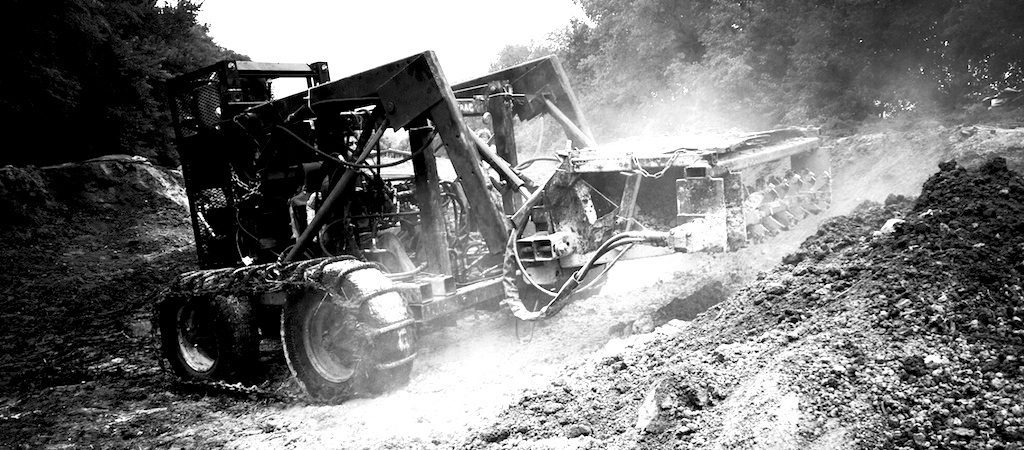
Prototypes
- 360 degree tracked backhoe – using 3D printed rubber tracks, and building upon our former backhoe prototypes. A critical machine in construction.
- Trencher – building upon past rotary prototype, to a chain-driven version. This is key for laying pipe and cable of all types.
- Auger – for digging postholes, tree holes, foundation holes.
- Solar MicroTrac – instead of diesel, we run on solar energy and batteries. Can also be used as a hydraulic power source in the workshop.
- Reinventing the Wheel – 3D printed rubber wheels for vehicles and tractors, and 3D printed bearings with steel balls.
- Stretch goal if enough people sign up: heavy duty screw machine – cnc lathe + mill + drill using 2″ Universal Axis, with 12″x12″x18″ working area. First functional prototype of heavy duty CNC with 2″ Universal axes.
- Stretch goal if enough people sign up: 132 Horsepower Tractor – Using multiple 33 Power Cubes, we will build a larger tractor if we have sufficient people sign up for Summer X – Month 2.

Product Releases and Extreme Build
- MicroTrac with 3D printed tracks and wheel modules
- CNC Torch Table
Moving the Dial in Access to Technology
- We are moving to the first open source tractor product release in the world to usher in a new level of access to appropriate technology heavy equipment, with a fully open source toolchain used to produce the tractor. We are also reinventing the wheel, literally.
- If the metal printing experiment works as expected, we will have produced the world’s first practical and open source Wire Arc Additive Manufacturing printer that works beyond the experimental phase.
- Solar tractors are fringe technology today. Our work can increase access, though we are not sustainable until sustainable batteries are developed.
Month 3

Prototypes and Builds
- Modular Utility Building – building a 12×20 structure to get familiar with modular construction.
- Construction Lumber Printer
- Mobile Microhouse – an 8×8 foot microhouse module with a welded steel angle frame, which can be put on wheels.
- CEB Patio
- Modular CEB + Panel Construction – CEB 16×16 structures that can be used for houses, multipurpose space, housing, kitchens, workshop space, Winter Workshop
- Pond for gravity energy storage – putting backhoe and trencher to work
- CEED Ecohome – The Compressed Earth Environmental Dwelling made from CEBs. Microhouse for the Living. Features living roof, CEB for walls, 3D printed foundation forms, 3D Printed plumbing, 3D printed lumber, and 3D printed building panels. This is an experiment at drastic reduction of building costs and times.

Product Releases and Extreme Build
- CEB with Soil Mixer
- Construction Panel 3D Printer – 4x4x8 foot panel printer, using waste plastic feedstock
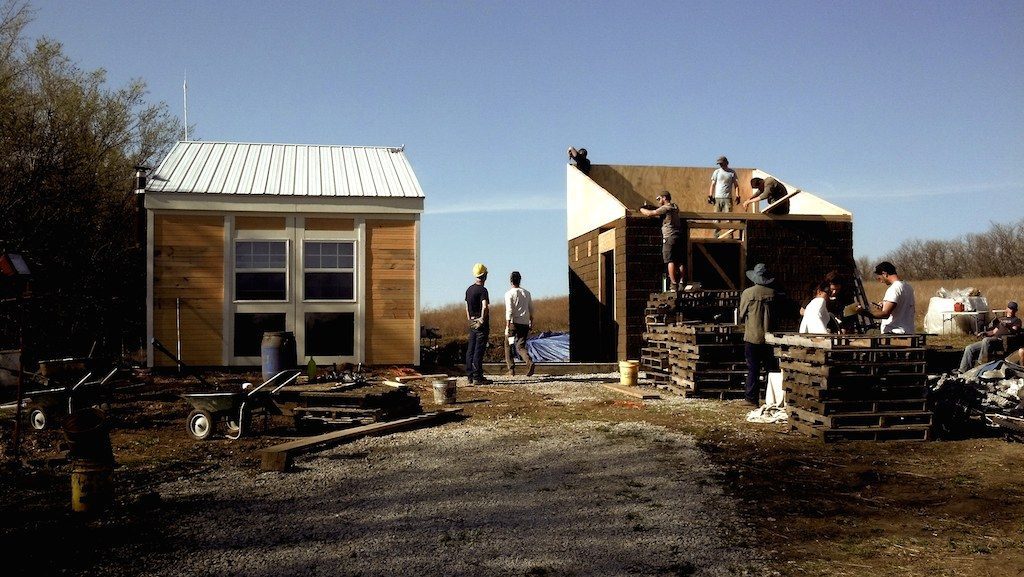
Moving the Dial in Access to Technology
- We are doing pioneering work in open source printers in producing construction materials and wall panels, and doing so using recycled feedstocks.
- We are making the production of commercial grade, stabilized CEBs accessible with our open source brick press and soil mixer, at 1/5th the cost of the nearest competitor. This may facilitate the use of CEBs as a practical building option for construction of low cost, as opposed to legacy homes, in the US.

- Anyone interested in reinventing the economy through collaborative design and distributed production using open source toolchains
- People who enjoy rapid learning of new things
- People considering a career change towards a meaningful area of endeavor
- College students looking for applied, hands-on skills and learning to balance their curriculum
- Teachers who want to expand to the Open Source Microfactory in their curriculum
- Competitive students looking to pad their college applications while simultaneously exploring a mind-opening experience
- Ecologically-concerned individuals looking for inspiration from a creative and practical approach to address economic production and sustainability
- Peak performers interested in learning about the limits of personal manufacturing
- People who believe that cities should produce all that they need, and who want to be part of the solution for getting there.
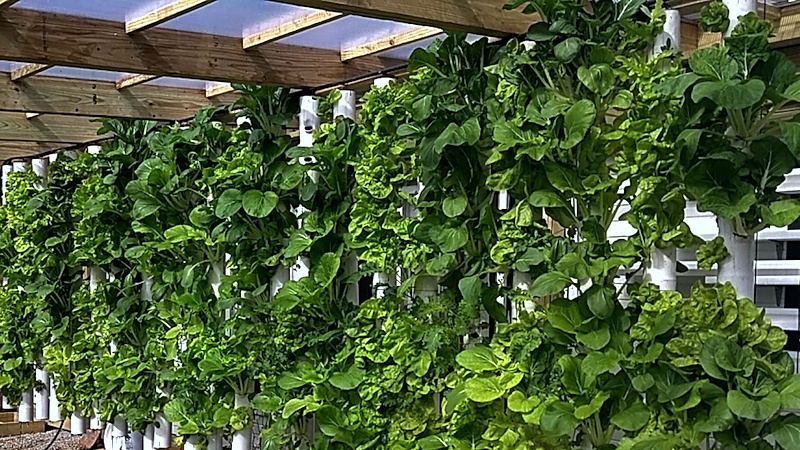
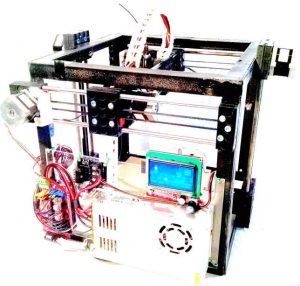
As part of the Summer X, each participant will receive a Developer Kit consisting of the following components. We will build all these parts into useful products or experiments, and these constitute a set of important building blocks for teaching, which can be extended into production. Participants each take their 3D printer, Raspberry Pi tablet, and other parts home with them.
- 3D Printer – D3D Universal 3D printer kit – with automated bed leveling, quick release spring steel print bed, Volcano nozzle for fast printing, and fast 1.2 mm stock printing nozzle. We include a spool of filament and a set of small tools required to put the printer together. Our printer is modular, highly expandable, and features the lowest part count of any 3D printer in the world. It is made for expandability and bootstrapping to industrial grade machines – yet it features a simple design made from common off-the-shelf parts – thus allowing a lifetime of service and the ability to grow the machine as your production needs grow. The 3D Printer includes an SD card of printing files to make the D3D Pro 3D Printer and the CNC Torch Table.
- Plotter Attachment Kit – a pen plotter attachment is included in the kit, which is mounted on D3D Universal as a separate, quick-attach toolhead for CNC plotting of pictures or for drawing circuits to be etched on copper-clad boards. The plotter attachments includes a pen.
- Milling Attachment Kit – the milling attachment kit includes a DC motor, coupler, and 1 mm milling bit, and quick-attach mount for mounting the motor to the D3D Universal CNC axis.
- Electronics Kit – This includes the parts necessary to build 2 Arduino Uno microcontrollers from scratch: components, strip board, copper clad board, soldering iron, copper chloride etchant, and a bath container for mounting on the D3D Universal bed for agitation. Combined with the Milling Attachment Kit, Battery and Welder Kit, and a KiCad lesson, this constitutes a rich lesson plan on circuit-making for practical purposes.
- Battery and Welder Kit – this includes all the parts necessary to build a battery pack from 18650 lithium ion cells, and a 3D printed welder Power Controller Board that can be powered by a stack of battery packs. Each kit contains 6 of the lithium ion cells, so we will combine multiple battery packs from several participants into a larger power pack to make a functional, 60-180 amp welder. We will build a simple welding electrode holder and 3D printed clamp – and we are ready for a welding lesson. The same Power Controller Board that we are using for the welder is a generalized Power Electronics Circuit can be modified to function as a light dimmer, DC motor power supply, and battery charger – and is controlled by the Arduino from the Electronics Kit.
- Raspberry Pi/Beagle Bone Tablet and Film Studio Kit – comes with a Raspberry Pi 4B, 7″ touch LCD, a 4K Camera Module v2 for video, and LED module as a warm camera or shop light. Kit includes connection wiring and a battery charger. Together with the battery packs of the Battery and Welder Kit, this is ready to be turned into a functional multipurpose tablet – with 3d printed tripod, camera stabilizer, light, and slider.
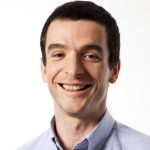
Marcin Jakubowski – Facilitator for the 3 Months
Marcin was trained as a fusion physicist. He left academia right after finishing his Ph.D. to start a farm – in Missouri – and founded Open Source Ecology. For the last 10 years, he has been working on the Global Village Construction Set – now 1/3 complete – a set of enabling tools and machines for building regenerative infrastructures. Marcin is passionate about creating the Open Source Economy – a new operating system for Earth. Marcin will facilitate the classroom, design review, and Enterprise Track sessions, and will try to stay out of the workshop as he is trying to move up in management.
See Marcin’s bio and Global Village Construction Set Ted Talk:

William Neal – Facilitator for the Open Source Microfactory Month
William is the Director of STEAM at London International Academy. Previously he was a teacher at School of the Nations in Guyana, South America, the Vice Principal Academic for London International Academy and Vice Principal for Nancy Campbell WorldCit Academy. He has taught STEAM education to teacher candidates at Western University (Althouse) since 2017. He received his B.Sc. Hon. in Theoretical Physics at the University of Guelph, B.Ed. at the University of Western Ontario, M.Ed. Curriculum Studies at the University of Toronto, and his PQP (Principal’s Qualification). In 2011 William spent two weeks at Factor e Farm, noticed how educational the experience was for his son and began incorporating activities based on open source software and hardware into his classes. This has transformed his career such that his classes are now full of integrated hands-on and project-based activities linked to the improvement of the community and the betterment of society. William started the first OSE STEM Club at the London International Academy in 2018.
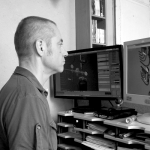
Michel Dhoore – Facilitator for the Open Source Microfactory Month
Open source society proponent. Jack of all trades, master of some. Over the years working in several sectors from printing, stage building, as theater technician and as a entrepreneur / contractor mainly in ecological insulation – gives Michel a broad technical insight. Michel is not so keen on schooling but very keen about learning and education and he doesn’t confuse the two. The internet has given him and humanity as a whole a tool to learn and share at an unprecedented rate. The last few years he has been focusing on 3D web visualization as a learning tool by using solely Open Source software tool-chains. On his website 3dcontent.be you can find some of the results. His final goal is building all kinds of stuff, not only virtual, in a totally Open Source workshop. He has co-designed the Universal Axis, and is currently developing the open source, 3D printed, axial flux electric motor.

Chris Caswell – Facilitator for the Open Source Microfactory Month
With a background in Computer Science, Chris became particularly interested in Open Source Hardware as he began to experiment with 3D Printing in 2011. He was inspired and driven by the vast potential of personal/distributed manufacturing as he witnessed the line between software and hardware begin to blur. In 2013 he quit his job in Boston and moved to Richmond, Virginia to work with the technology full time. This work eventually became a Full Service 3D Print Shop – 3D Central – specializing in desktop FDM printers. He primarily does custom fabrication and rapid prototyping, along with continuing to offer 3DP related services to the surrounding community. Over this time he has replicated over 10,000 things, and trained hundreds of folks on the basics of the technology.
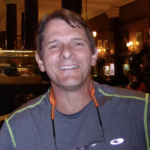
Thomas Griffing – Facilitator for the Heavy Machines Month
Tom has a background in Electrical Engineering, Computer Science, Technical Writing and Hydraulics. He runs a small computer consulting business, instructs Tai Chi classes and also teaches “online” computer classes for a community college in Dallas. He has a farm in East Texas with a shop where he practices permaculture farming, works on projects of interest and sells Power Cube kits, parts and other items. He has also led OSE workshops on fabricating the Power Cube and Micro Power Cube. Tom Griffing is OSE’s Power Cube Lead and has been in Power Cube development since 2011.
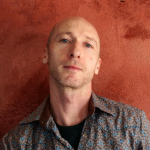
Gabe Krause – Facilitator for the Heavy Machines Month
As CTO for NEXI, Gabriel Krause recently developed an electronic device made to influence sustainable behavior changes in household electrical use. He enjoys collaborating on systems that facilitate human engagement in social arenas and sustainability issues. He served as lead designer for The Waterpod – a floating, eco-habitat designed for climate change. The project, which has evolved into Swale, was a model for sustainable living and continues to influence positive social and environmental policy changes in NYC. Gabe also developed residential-scale greywater reclamation and storage system using only non-chemical techniques often found in large-scale municipal wastewater treatment systems. Gabriel has degrees in applied mathematics and contemporary dance, is an avid contributor on Appropedia, and is well-versed in open source design software.
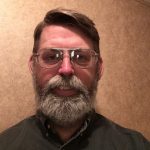
Jeff Higdon – Facilitator for the Heavy Machines Month
Generalist, entrepreneur, teacher, off gridder, and “Mr. Fixit Man”. Jeff came across Open Source Ecology while taking Geoff Lawton’s permaculture design course and was bitten by the bug. Frustrated with overly complicated proprietary technology and repair manuals that say “take to a qualified technician”, he immediately saw the value in open source. Jeff brings to the table a broad depth of knowledge from his background working in and managing manufacturing and repair centers over the years and teaching vocational skills in a prison. Both at work and in his spare time he can generally be found building or fixing something. As a welder and fabricator, Jeff wlll be one of the facilitators for Heavy Machines one month session.
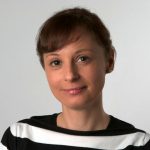
Catarina Mota – Facilitator for the Construction Month
Catarina is an open source advocate. She founded the Open Building Institute, co-founded Open Materials (do-it-yourself smart materials) and AltLab (Lisbon’s hackerspace). Previously, she co-chaired the Open Hardware Summit 2012, served on the board of directors of the Open Source Hardware Association, taught as an adjunct faculty member at ITP-NYU, and was a fellow of the National Science and Technology Foundation of Portugal. Catarina holds a Ph.D. in communication sciences and her research work focuses on the social impact of open and collaborative practices for the development of technologies. She is a founding member the Open Source Hardware Association and a TED fellow.

Jessica Leete – Facilitator for the Construction Month
Jessica Leete is a designer, a licensed landscape architect, sculptor, urbanist, community catalyst and ecology educator. She is the founder of Boston dot dash Studio. The studio is the space for convergent thinking, design process, and construction regarding land and the systems that engage it to create regenerative solutions that reverse environmental degradation, are resilient, adaptable, and (through an engaged design process) provide training for an empowered community. The studio is about realizing solutions, the act of making, and how the process of design can affect positive change. The first of many, she encourages you to join the movement, start your own (location) dot dash Studio. A member of the Global Open Source Hardware (GOSH) movement, her particular interest lies in developing and making ubiquitous, open source hardware and technology for environmental metrics. To that end, she is collaborating with Open Source Ecology to enable universal access to collaborative design using open source toolchains.
Gary Kanak – Facilitator for the Construction Month
Generalist and carpenter. Gary has participated in the Microhouse 4 build and was a team leaders at the Seed Eco-Home build at Open Source Ecology, and is an avid supporter of collaborative design. Gary brings general construction skill to the table.
We can pick up participants who are arriving by plane at the Kansas City International Airport the evening before the first pay.
Accommodations
We have 21 spots for participants who want to stay at the HabLab—our shared-room dorm, and 2 Solar Cubicles for a total of 23 people.. There is no extra cost for staying at the dorm and spots are filled on a “first come, first served” basis. Please note that this is a very rudimentary earth building and our accommodations are rough. The dorm rooms may be noisy due to late night conversations by participants. Factor e Farm is an experimental facility that is permanently under construction, so please gauge your expectations accordingly. If you want a more comfortable stay, we recommend that you stay in a hotel.
Participants may secure a hotel in Cameron, Missouri (15 miles away) if there is no space left in HabLab. Please note that there is no public transportation between Cameron and Factor e Farm and that we cannot pick you up or drop you off on a daily basis during the workshop. Car rentals are available at the KCI airport.
We also have primitive camping on site which includes a composting toilet. Showers and a bathroom are located both in the HabLab and in a new addition.
Transportation
The nearest airport is Kansas City International (MCI), about 1:15 hours away from Factor e Farm. FeF is located in a rural zone and there is no public transportation of any kind in the area.
If you are driving, please schedule your arrival on site at 6 PM or later on the evening one day before the start date of the Summer X month of your interest. Please schedule your departure on the day after the Camp if you need a ride to the airport.
We are scheduling airport pickup at 8 PM on the evening before the first day of the workshop each month. We are scheduling an airport dropoff in the morning after the last day of each Summer X month.. Airport dropoff will be as early as needed for the first flight, so plan accordingly. Car rentals are available at the KCI airport, if you’d rather not wait for pick up or dropoff.
Since the round trip to the airport is 2:30 hours, ideally we would like to make only one trip to the airport at the times above. The MCI airport is tiny and there isn’t much to do there, but it has a few restaurants/cafes and quiet areas to rest. We will also try to coordinate transportation if any people arriving by car are willing to pick others up from the airport.
To the extent that it’s possible, we request that you try to schedule your flight arrival and departure as above to make logistics smoother.
Meals
OSE will provide breakfast, lunch, and dinner. We will have a person preparing meals in the kitchen and on the outdoor grill. We are not growing produce at this time, so we will go to the supermarket for supplies. Our cook will coordinate the menu with participants.
If you need additional food, Cameron, Missouri, is 15 miles away and has a food store and a Walmart. There is also a small grocery store in Maysville, which is 2.5 miles away.
What to Pack
You are welcome to bring your own tools if you wish to. But we will have all the necessary tools on site—as well as work gloves, protective eyewear, and hard hats.
Please bring steel-toe boots – as we may be working with heavy metal objects. Steel toed boots are the safest footwear for any workshop. Steel toed boots are required for safety in the workshop, and people without steel toed boots are not allowed in the workshop.
This being Missouri, the weather is highly unpredictable. It is likely to be hot. It can also get quite muddy when it rains, so sturdy boots are recommended.
Please also bring a sleeping bag and a bath towel if If you’re staying in the HabLab, we have fitted sheets, pillows and pillow cases available – but you may want to bring your own pillow if that’s something that is important to you. If you’re camping, please pack everything you’d normally pack for a camping trip.
Registration Options
- Early Bird Registration – Basic Program – 1 month: $3995 for one month. 1 month of onsite participation includes tuition, room, board, and also the OSE Dev Kit (3D Printer and Raspberry Pi tablet materials, plus other experiments – see OSE Dev Kit description). If you’d like to participate in more than one month, each additional month is $3495. Deadline for early bird registration is Saturday, February 15, 2020 at 11:59 PM, after which the cost goes to $4295.
- Early Bird Registration – Enterprise Track – 1 month: $4995 includes the Basic Program plus enterprise development seminars – (includes Dev Kit). If you’d like to participate in more than one month, each additional month is $4495. Deadline for early bird registration is Saturday, February 15, 2020 at 11:59 PM, after which the cost goes to $5295 for the Enterprise Track.
- Remote Participation – There are 2 options – the Main Track Remote – and the Enterprise Track Remote options. Each costs $499 for one month of remote participation. If you would like to select both options, please select 2 in the drop-down for the number of tickets at the REMOTE PARTICIPATION registration below – or more if you are interested in multiple months. See the How It Works Section above for more information about the Remote Tracks. The OSE Dev Kit is not included in the Remote Participation option, but you can purchase that separately.
- Extreme Manufacturing Workshop – (3 days)- $599 for a live, 3 day, immersion build experience of the final product. See schedule above. If you would like to sign up for this option, please use the Donate to OSE button at the registration form.
- Donate to OSE – Sponsor another participant or Donate to OSE: We are a nonprofit organization with 501(c)3 status, and you can make tax-deductible contributions to us. You can fund attendance of someone who is on the waiting list for financial assistance. We receive low-income assistance requests for all of our workshops. Sponsor by paying the quantity on the order form below. Please email us at info@opensourceecology.org that you are sponsoring someone else. We can send you a tax deduction receipt (US customers only). You can also donate via BitCoin:

Bitcoin Address: ”’166yC48RakrZdtsBj36vY9q29CpzknHbxY”’
Payment Options: PayPal, Check, eCheck Bitcoin, Money Order, or Wire Transfer
To register, we use Eventzilla (below) – which accepts PayPal or eCheck options. Using the eCheck option (bank routing + account number) avoids the 3% PayPal fee. To avoid fees, you can send payment (paper check, etc.) to Open Source Ecology, 909 SW Willow Rd, Maysville, MO 64469. We can also accept Bitcoin and and wire transfers. Email us at info at opensourceecology.org for additional instructions.
All sales are final, as we are making significant material purchases and incurring logistics expenses in preparation for this camp. In case of the unlikely events such as weather or civil unrest, we plan to postpone the event until a more favorable date.
Have questions? Drop us an email: info-at-opensourceecology-dot-org
Do the 3 Day participants also receive the Dev Kits? What are the logistics of returning home with these kits, as I assume these are large machines. No, the 3 day Extreme Build participants participate in the builds of the large machines or construction projects such as the Aquaponic Greenhouse. This is separate from the Dev Kit, which consists of the small desktop machines and experiments: 3D printer, attachments, and other experiments as discussed in the Microfactory Prototyping and Developer Kit section. If you would like to order the 3D printer – which is the main part of the kit, you can do so here. If you would like to preorder the entire Dev Kit which includes the electronics, battery, and tablet components – you can pre-order by emailing us.
For the Remote Participation option – is it $499 for each of the three courses? Yes, the $499 includes one month. Each month focuses on different topics but builds upon the former: Month 1 is the Open Source Microfactory, 2 is Heavy Machines, and 3 is Construction/Aquaponics. The heavy machines build upon the 3D printing and torch table of Month 1, and the Construction/Aquaponics builds upon the heavy machines. You can choose remote participation for one or more months.
Does the Remote Participation include the Dev Kit? No, but you can email us to pre-order one.
Can the videos be watched again after the live stream? Yes, we are recording all the classroom live streams, and we will send a YouTube link to all participants. We will also be doing a number of time lapses and build videos, and all these assets will likewise be available to participants.

Comments are closed, but trackbacks and pingbacks are open.